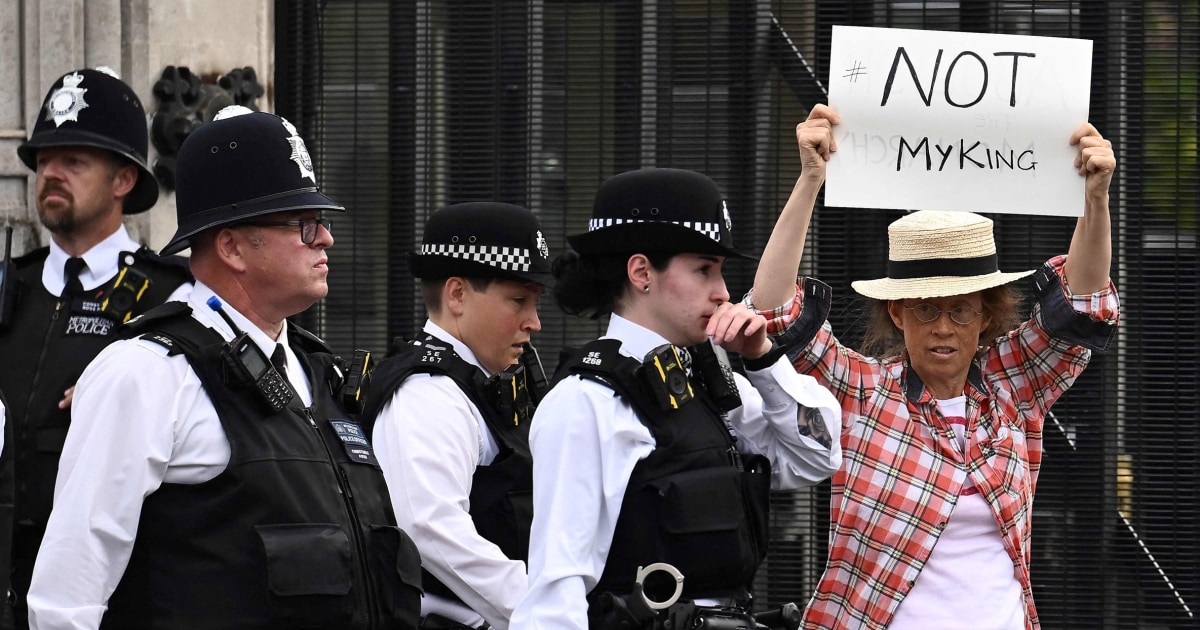
www.nbcnews.com
Long live King Charles III! Now comes a new assessment of the monarchy
It may have felt like the United Kingdom was brought to a supportive standstill after the death of Queen Elizabeth II, but not everyone in these isles agrees
International
LONDON — It may have felt like the United Kingdom was brought to a supportive standstill after the death of Queen Elizabeth II, but not everyone in these isles agrees that a hereditary monarch should remain the unelected head of state in a modern democracy.
Polls suggest that a significant minority — millions of Britons — want to abolish the monarchy. Many of these people kept quiet last week, out of respect for the queen, but a few braved the crowds to bring a defiant message for their newly ascended sovereign: "Not my king."
These republican rumblings are not new. But many campaigners believe King Charles III presents a unique opportunity: They think most royalism was actually fondness for the widely loved queen, and he — a new, less popular king — won't inherit this support.
The debate has made for some febrile scenes.
As thousands crammed into the historic streets of Edinburgh to see Charles being proclaimed monarch in Scotland on Sept. 11, a small group of naysayers booed, held anti-royal placards and turned their backs while declaring “no consent.”
One woman, who held a sign saying “F--- imperialism” was arrested for a breach of the peace. And all were met in turn with boos, followed by chants of “God save the king!”
“We wanted to make it clear that there’s more than one viewpoint about the monarchy in this country,” said John Hall, 33, one of a half dozen protesters. “I wanted to be here and mark the fact that I did not consent to this pageantry.”
The anti-royalist crew outside Edinburgh's St. Giles' Cathedral was among a smattering of protesters who dotted the United Kingdom, popping up in London, Wales and elsewhere. They often drew an angry reaction from the mourners and spectators who had come out to see the queen make her final journey from Balmoral Castle, in the Scottish Highlands, where she died, to Windsor Castle, west of London, where she was buried Monday.
Many of the activists interviewed by NBC News across the country said they didn't want to disrupt the mourning period, and that they would not be protesting at events commemorating the queen specifically. But they felt they had no choice but to make their voices heard because Charles' ceremonial appointment — a highly political event, they argue— was happening at the same time.
The crux of their argument is that the lottery of birth has no place deciding the head of state of one of Europe's largest economies. They also say the monarchy costs the British taxpayer hundreds of millions of pounds a year. (This is disputed by monarchists, who say the royal “brand” brings in a net gain from tourism and culture.)
Then there are those who disagree with the message it sends.
While anyone, in theory, can be president of the United States, only a select few people can be Britain's head of state. For critics, this is part of a rigid class system that tacitly tells Britons: No matter how hard you work, it still matters who your parents are.
These views are not as fringe as suggested by the mass crowds and the wall-to-wall coverage of the queen's passing.
The monarchy is widely but not universally popular. Around 62% of people in Briton support it, but 22% — translating to more than 10 million British adults — want to see it replaced with an elected leader, according to a poll by YouGov in June.
Abolitionism has gradually grown since the 1990s, according to the National Centre for Social Research, a London-based institute that has conducted surveys on the monarchy over the past 30 years.
Royal popularity has been rocked by events such as Charles' divorce from Princess Diana, and his family's perceived coldness after her death in a car crash, the institute said, as well as allegations of sexual assault against Prince Andrew, which he denies, and the decision by Prince Harry and Meghan, Duchess of Sussex, to move to California amid their allegations of racism against the royal household.
























































